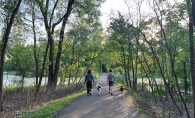People have traditionally looked to travel to find themselves. Summer Hills-Bonczyk reflects that travel takes many forms: It can be a vacation, a trip, even a journey. But if we want to truly transform travel and have the opportunity to transform ourselves, Hills-Bonczyk suggests we consider the ultimate in conscious, or mindful, travel—a pilgrimage. On a pilgrimage, says Hills-Bonczyk, “we must be willing to meander. We need to suppress ambition and desires to accomplish. Many of us are so wrapped up in doing and achieving,” she says, “that we have forgotten how to be.” A pilgrimage, she suggests, invites people into the present moment, a place where you’ll “slow down, linger, savor, be more mindful and soulful, and see places from the eyes of the heart.”
If you were to have Summer Hills-Bonczyk lead your next life journey, you’d meet a woman who wants to share her ideas about conscious travel: traveling through life, and even through art, in a more mindful, meaningful way.
“I really see the poetry and beauty of anything to be in the process,” says Hills-Bonczyk. It’s why she transformed displays of her own ceramic artwork, static and finished, into performance art involving massive hunks of clay on stage. It’s why she and her mother, also a yoga instructor and a lover of travel, began conducting yoga retreats in Guatemala and Peru. “Through the lens of yoga you can see another culture in a different way,” Hills-Bonczyk says. Perhaps even more significant, however, is how travel can help you see yourself in a different way. “The concept of retreat is to remove yourself from your daily routine, to start to imagine how to open your mind, to get to know yourself.”
The keys to pilgrimage vs. everyday travel are three. The first is attitudinal: an intention to return home changed. Second, a pilgrimage must include a challenge. This challenge may be something as well-known as the Camino de Santiago pilgrimage route of 100-plus miles in Spain, or it may be the private emotional challenge of mending a relationship. Third, says Hills-Bonczyk, “a pilgrimage involves travel to a sacred destination.” A sacred destination need not be exotic or far away, insists Hills-Bonczyk. In fact, it can be as unassuming as a local restaurant or park, or the finish line of a marathon. By sacred destination she means, simply, that the traveler must arrive at a deeply personal and/or emotionally engaging place by journey’s end.
“Of course,” Hills-Bonczyk is quick to add, “the personal transformations that are the goal of pilgrimage cannot be forced. But you can help create conditions that make it happen.” In any travel you undertake, keeping the following in mind can make the difference between a simple trip and a life-changing pilgrimage.
- Have a personal purpose for your journey.
- Balance planned and unplanned time and be willing to be distracted.
- Minimize drinking and shopping.
- Consider going off the grid.
- Express gratitude freely in tips, verbal exchanges and the like.
- Be easily amused.
- Use all five senses.
- Suspend judgment.
“On your return home, make sure to share the stories of your experience,” says Hills-Bonczyk. And perhaps most important of all, make lifestyle changes that reflect the ways your pilgrimage has transformed you. For more information about conscious travel, see Hills-Bonczyk’s TEDx Edina talk on youtube.com.
Check out more from Hills-Bonczyk’s multi-faceted career including the launch of Project Bend (projectbend.com), “an immersive two-week summer program that gives teens the tools to bend and grow into themselves instead of breaking under pressure.” Like many of Hills-Bonczyk’s diverse projects, Project Bend involves art, yoga, and a journey within.









